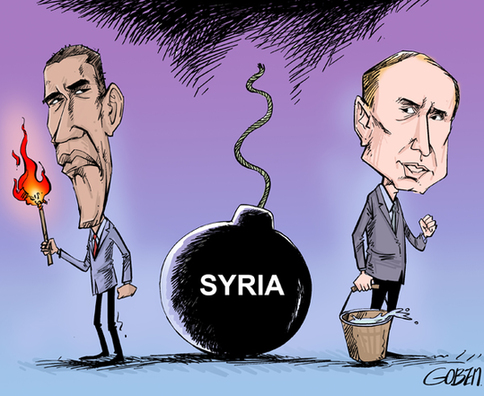Russia proposal likely to avert US airstrikes
- By Chen Weihua
 0 Comment(s)
0 Comment(s) Print
Print E-mail China Daily, September 12, 2013
E-mail China Daily, September 12, 2013
Obama asks Congress to postpone vote on attack
|
|
|
Putting out the fire [China.org.cn] |
US President Barack Obama has spent the past two weeks trying to make his case for a limited military strike against Syria over the alleged use of chemical weapons by its government forces. In an address to the nation on Tuesday night, however, he said he asked Congress to postpone a vote to authorize the use of force.
He did so after Russia made a proposal to place Syria's chemical weapons under international supervision, pending later destruction, Obama said.
"It's too early to tell whether this offer will succeed, and any agreement must verify that the Assad regime keeps its commitments. But this initiative has the potential to remove the threat of chemical weapons without the use of force, particularly because Russia is one of Assad's strongest allies," Obama said in his 15-minute address from the East Room of the White House.
The Russian proposal was made on Monday just hours after US Secretary of State John Kerry said in London that the government of Bashar al-Assad could avoid military strikes if it handed over its chemical weapons within a week.
Damascus welcomed the move, with Syrian Foreign Minister Walid Muallem saying, "We fully support Russia's initiative concerning chemical weapons in Syria and we are ready to cooperate." He also said, as part of the deal, Syria intends to join the Chemical Weapons Convention.
Obama said Kerry will meet his Russian counterpart, Sergey Lavrov, in Geneva on Thursday while the US president continues discussions on the issue with Russian President Vladmir Putin.
"And we will work together in consultation with Russia and China to put forward a resolution at the UN Security Council requiring Assad to give up his chemical weapons and to ultimately destroy them under international control," Obama said.
China, which opposed military strikes against Syria, also applauded the proposal.
Chinese Foreign Ministry spokesman Hong Lei confirmed that a six-member delegation sent by a Syrian opposition organization known as the Syrian National Dialogue Forum began a visit to China on Tuesday.
The delegation, invited by the Chinese People's Institute of Foreign Affairs, will meet Foreign Ministry officials to discuss the Syrian situation.
"China has always believed that a political resolution was the only practical way out of the Syrian crisis," Hong said, adding that hosting the Syrian opposition delegation was part of those efforts.
Opinion changed
Syria is one of the five countries that have not signed the Chemical Weapons Convention, which bans the production, stockpiling and use of chemical weapons. The four others are the Democratic People's Republic of Korea, Angola, Egypt and South Sudan.
A Pew Center survey published on Monday showed that the number of US citizens who opposed US airstrikes against Syria jumped 15 percent over a week, from 48 percent to 63 percent, as many who were previously undecided turned against military action. Fifty-three percent of Democrats opposed such airstrikes.
A CNN/ORC International survey released on Monday showed 54 percent of the polled US citizens believe it is "likely but not certain" that the Syrian government used chemical weapons.
An interview by CBS anchorman Charlie Rose with Assad over the weekend also delivered a message rarely heard in US media, when Assad claimed a US strike would be in direct support of al-Qaida fighting in Syria.
"What do wars give America? Nothing," Assad said. "No political gain, no economic gain, no good reputation. The credibility of the US is at an all-time low."
Just one day before Obama addressed the nation to sell his plan, he arranged interviews with six TV networks on Monday, the most in a single day since he took office, in a bid to convince the public of the need for military action.
His Cabinet members, such as Kerry, Defense Secretary Chuck Hagel, Chairman of the Joint Chiefs of Staff Martin Dempsey and National Security Advisor Susan Rice, have been busy trying to win support both at home and abroad, in a mission that was deemed extremely difficult.
"For this diplomatic option to have a chance of succeeding, the threat of a US military action — the credible, real threat of US military action — must continue," Hagel said on Tuesday in his testimony before the US House Armed Services Committee.
Observers said Russia's proposal would be a win-win situation for both Assad and Western countries, but not for the rebels.






